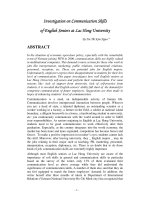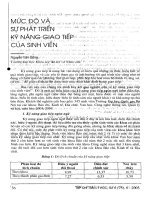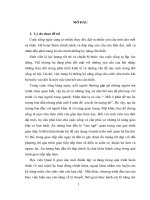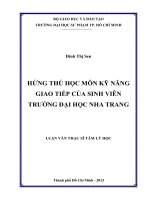Khảo sát kỹ năng giao tiếp của sinh viên năm cuối khoa Ngoại ngữ - Trường ĐH Lạc Hồng
Bạn đang xem bản rút gọn của tài liệu. Xem và tải ngay bản đầy đủ của tài liệu tại đây (88.17 KB, 9 trang )
- 1 -
Investigation on Communication Skills
of English Seniors at Lac Hong University
By Tra Thi Kim Ngan *
ABSTRACT
In the situation of economic open-door policy, especially with the remarkable
event of Vietnam joining WTO in 2006, communication skills are highly valued
in multinational companies. This demand is more serious for those who work in
jobs like interpretation, marketing, public relations, international relations,
personnel, reception, etc. These are potential jobs for English majors.
Unfortunately, employers express their disappointment in students for their low
level of communication. This paper investigates how well English seniors at
Lac Hong University self-assess and perform their communication. For some
reasons like: lack of support from university, lack of self-practice from
students, it is revealed that English seniors’ ability fall short of the demand for
competent communication of future employers. Suggestions are then made in
hopes of enhancing students’ level of communication.
Communication is a need, an indispensable activity of human life.
Communication involves interpersonal interaction between people. Whoever
you are: a head of state, a talented diplomat, an outstanding scientist or a
worker working in a factory, a farmer on the field, a soldier at national island
boundary, a diligent housewife in a house, a hardworking student in university,
etc; you continuously communicate with the world around in order to fulfill
your responsibilities. As seniors majoring in English at Lac Hong University,
students need to be good communicators to work effectively after their
graduation. Especially, as the country integrates into the world economy, the
market has been more and more expanded, competition has become fiercer and
fiercer. To make a positive impression in recruiter’s eyes, students cannot lack
this skill. Moreover, after leaving university, they _ English majors _ may do
the jobs relating to their major such as teaching, PR, marketing, personnel,
interpretation, reception, diplomacy, etc. There is no doubt that to do those
kinds of job, communication skills are extremely highly important.
Although most English seniors at Lac Hong University are aware of the
importance of soft skills in general and communication skills in particular
based on the survey of the writer, only 13% of them evaluated their
communication level as above average while they did understand the
significance of communication skills. A number of them also said that they do
not feel equipped to match the future employers’ demand. In addition, the
writer herself after three months of intern at Department of International
Relations (Vietnam National University-Ho Chi Minh city) has recognized that
- 2 -
to get a work well done, it requires many skills, especially communication
skills. However, she finds herself not very good at communication. Besides,
there is a number of study on students’ communication capacity but no research
on communication competence of English seniors at Lac Hong University.
Therefore, the researcher decided on this project with the purpose of attempting
to find out:
1. Students’ perception and understanding about communication skills
2. Students’ self-assessment of their own communication ability
3. Students’ real competence on communication
This project also aims to use the data which were collected from the survey on
students to make recommendations to students in training themselves and
spending time on activities helping upgrade communication capacity as well.
Furthermore, the researcher also makes recommendations to the Faculty of
Foreign Languages on curriculum adjustment. The researcher wants to answer
the question whether it is necessary for the Faculty of Foreign Languages to
design communication subjects for the curriculum and add other useful
activities so that students are well prepared to meet requirements from
employers.
Literature Review
“Communication is building a message, sending it in hopes of receiver will
understand its content.”[1]
Effective communication requires many skills like:
• Making first impression
• Verbal communication
• Non-verbal communication
• Empathy
• Questioning skill
• Active listening skill
• Cultural awareness
• Team working
• Writing skill
• Conflict-solving skill
• Public speaking and presentation
skill
• Negotiation skill
• Providing leadership [2]
Because of limited time, the researcher cannot cover all those kinds of skills.
This project focuses on the first few in the list above: making first impression,
verbal communication, non-verbal communication, empathy, questioning
skills, and active listening skill. In other words, the primary focus on the
research is students’ interpersonal skills or conversational skills. They are the
most fundamental and basic skills in real life and in any kind of job.
The communication abilities of students have become a very big concern of
many people including employers, parents, teachers, students and so on, which
is why a number of investigations, surveys, and research on the issue have been
- 2 -
done worldwide in order to upgrade students’ competence of communication.
“Overall the skills in which the new graduates employed appear to be most
deficient are problem solving skills, oral business communication skills and
interpersonal skills with other staff” [3]. Moreover, most of practitioners
throughout North American stated that “new graduates are well prepared with
technical skills, but frequently are deficient in communication and
interpersonal skills" [4] when they were asked whether they satisfy with new
graduates.
Sheila reported that Hindi Medium students’ inadequate communication is
consequent from many causes. Shukla indicated that “lack of proper guidance,
lack of exposure to formal environments, adequate interaction in family, poor
family educational background, lack of educational facilities, difficult finance,
lack of confidence, and ongoing struggle of these students to translate their
thoughts from Hindi into English
”
[5]
result in to their deficiency of
communication ability. He suggested solutions in terms of the roots of
problem.
In another research, it was said that “majority of the students have high
communication apprehension (fear) and around 60 percent of them lack
communication skills” [6]. They highly evaluated the active role of teachers as
a diagnostician, counselor, communication specialist, soft skills trainer in help
students overcome their fear and thus develop their communication ability. In
addition, lack of knowledge of intercultural communication, cultural shock and
differences in nonverbal communication and politeness strategies result in
many difficulties for students to interact with students from other countries.
Most of these above researchers looked at the communication level of
students, reasons of their poor communication and solutions. Some of them
were interested in communication skills in general. Some others focused on
only one aspect separately of communication skills like public speaking,
making presentation, intercultural communication, etc. In the present research,
the writer tried to answer three questions. The first one is how students
perceive the importance of communication skills in current recruitment setting;
second, how do students assess their own communication ability, and, finally,
how well students perform their communication via a communication skills
assessment test.
Methodology
To carry out this project, 10-item questionnaires and 16-item tests were
distributed to 90 senior students of Faculty of Foreign Languages. The
questionnaire included personal information and rating part and an assessment
of communication ability part. In the question part consisting of 10 questions,
the writer used different kinds of question like ranking, rating, frequency, open-
ended. Its design was very friendly user with attempts made to avoid academic
terms so that students have no confusion. In order to assess students’ level of
communication, the writer also included 16-item tests on conversational
communication designed by Robin Jacobs, Portland Community College. The
- 3 -
test mainly focuses on interpersonal or conversational skills_ most fundamental
skills. After all, quantitative method was employed to analyze the collected
data.
Findings from the questionnaire
Students’ Self-assessment towards their Communication Skills
Surprisingly, nearly 2/3 of students rated their communication level as only
average. In addition, 1/4 of students stated that they were weak and very weak
on communication skills, and very few evaluate themselves as above average.
Chart 5: Students' Self-assessment towards their Communication Ability
6
17
64
11
2
0
20
40
60
80
100
Very poor Poor Average Fair Good
Percent
Students’ Self-assessment towards their Communication Skills in Detail
Students were asked to rate their specific communication skills, using a scale of
Chart 6: Students' Rating their Communication Skills in Details
6.4
6.2
6.0
6.0
5.8
5.7
5.7
5.6
5.5
5.4
5.1
5.1
5.0
0
2
4
6
8
10
Skills
Mark
Empathy
Teamwork
Verbal communication
Active listening skill
Questioning skill
Making first impression
Cultural awareness
Writing skill
Public speaking and
presentaion
Conflict-solving skill
Providing leadership
Non verbal
communication
Negotiation skill
- 4 -
1 to 10 with 1 equal very weak skills and 10 equal their best skills. None if the
items received high average rankings, with conversational skills like empathy,
verbal communication, active listening, questioning, making first impression
rated slightly higher than more advanced skills like cultural awareness, public
speaking and presentation, conflict-solving skill, or providing leadership, etc.
In general, their skills ratings vacillated from 5 to 6 on a scale of 10.
Students’ Perception towards Communication Skills Training Program
In this question, the writer asked students whether they are frequently trained in
communication skills with classes or activities. No one said that the university
holds classes and activities very usually. Chart 6 indicates the inattention of the
university to communication training.
Chart 7: Frequency of Holding Classes as well as Activities Relating to
Communication Improvement at Lac hong University
0
13
52
29
6
0
20
40
60
80
100
Very usually Usually sometimes Rarely Never
Percent
Because of lack of communication training program in the university, many
students expressed their dissatisfaction. Only 17% of them indicated
satisfaction with the communication training program.
Chart 8: Students' Satisfaction from Communication Skills Training Program
3
14
45
20
8
0
20
40
60
80
100
Completely agree Partially agree Normal Partially disagree Completely
disagree
percent









